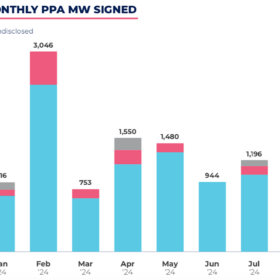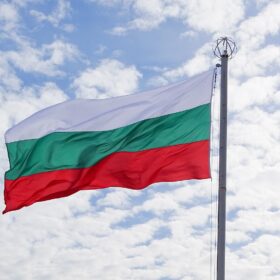Utrecht to host vehicle-to-grid car sharing service
Car manufacturer Renault, smart charging solutions provider We Drive Solar and the Netherlands’ leading car sharing platform MyWheels are teaming up to launch a car-sharing service in the city of Utrecht. The vehicles will utilize vehicle-to-grid technology, running on clean energy and feeding power back to the grid during high demand periods.
Pexapark records 29 European PPAs for 1,227 MW in October
Pexapark, a Switzerland-based provider of market intelligence for renewable energy, says European developers signed 29 power purchase agreements (PPAs) totaling more than 1.2 GW in October.
German researchers investigate molecular solar thermal energy storage
A four-year research project by several German universities is exploring the release of molecules involved in molecular solar thermal (MOST) energy storage. They plan to modify the molecules to achieve the best possible properties for the storage technology.
More than 19 GW of solar projects set for implementation in Poland
Poland’s Institute for Renewable Energy (IEO) says that building permits have been issued for nearly 1,500 solar projects totaling over 12.3 GW. Some of these projects may secure authorization in Poland’s upcoming renewables auction, set for December.
Scientists create PV-driven synaptic device for AI processing
A team from Tokyo University of Science has developed a solar cell-based computing device that mimics human synaptic behaviour to use in edge AI processing. The researchers say the device has the potential to accelerate the development of energy-efficient edge AI sensors in applications including health monitoring, surveillance and automotive technologies.
Jamaican government assigns 99.83 MW of solar capacity
Developers Wigton Energy and SunTerra Energy Jamaica are each set to build, own and operate large-scale solar projects in Jamaica after successfully bidding in a 100 MW renewables tender held in 2023.
UK government expands heat pump grant scheme
The UK government will make GBP 295 million ($308.4 million) in grant funding available to homes switching from gas boilers to heat pumps in the 2025-26 fiscal year. Meanwhile, forthcoming reforms will allow air-source heat pumps to be installed without the need to submit planning applications.
New research finds utility-scale solar parks foster biodiversity
A series of longitudinal studies of three solar-pollinator sites in Minnesota have demonstrated evidence of native prairie growing under solar panels, providing both soil benefits and habitat for wildlife and pollinators.
Funding secured for 237.6 MW merchant solar plant in Bulgaria
Up to €103 million ($107.2 million), from the European Bank for Reconstruction and Development and Raiffeisen Bank International, will support the development of a fully-merchant, 237.6 MW solar project in southeastern Bulgaria.
Agrivoltaics can improve water conservation in Africa
Research led by the University of Sheffield installed an off-grid agrivoltaic system in Tanzania and a grid-tied agrivoltaic system in Kenya. They found the installations helped boost crop yield and conserve water while generating electricity at a lower cost than the national grid.











